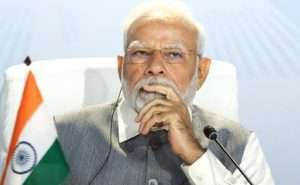In a landmark visit to Kyiv, Indian Prime Minister Narendra Modi aims to mediate peace efforts between Ukraine and Russia, despite controversy over his perceived closeness to Vladimir Putin.
Indian Prime Minister Narendra Modi is set to meet Ukrainian President Volodymyr Zelenskiy in Kyiv on Friday, marking a significant diplomatic effort to address the ongoing conflict between Ukraine and Russia. This historic visit comes as Modi positions himself as a potential mediator, nearly three years after Russia’s invasion of Ukraine and amid a fierce Ukrainian counteroffensive.
Ahead of his visit, Modi emphasized India’s commitment to promoting peace through dialogue rather than conflict. “No problem can be resolved on a battlefield,” Modi stated, reiterating India’s support for “dialogue and diplomacy to restore peace and stability as soon as possible.” This visit makes Modi the first Indian prime minister to travel to Ukraine.
However, the prospect of a diplomatic breakthrough remains uncertain, especially after Ukraine’s surprise military advances into Russia’s western Kursk region. Moreover, Modi’s ability to serve as an effective mediator is in question, as his relationship with Russian President Vladimir Putin has drawn skepticism in Ukraine. Modi faced criticism for warmly embracing Putin during a visit to Moscow in July, a gesture that did not go unnoticed in Kyiv.
Modi intends to discuss a peaceful resolution to the conflict with Zelenskiy and explore ways to strengthen India-Ukraine relations. “As a friend and partner, we hope for an early return of peace and stability in the region,” Modi stated on social media prior to his arrival in Ukraine. Zelenskiy hinted that several agreements could be signed during their meeting.
India’s diplomatic stance has been complex, given its historically close ties with Russia and its growing partnerships with Western nations. While Delhi has refrained from explicitly condemning Russia’s invasion and has abstained from UN resolutions criticizing Moscow, it has consistently advocated for dialogue between the conflicting parties.
Despite these efforts, a peace deal appears more distant than ever. In 2022, Ukraine passed a decree ruling out direct talks with Putin, and Moscow recently dismissed negotiations amid Kyiv’s recent counteroffensive. Putin has insisted on the withdrawal of Ukrainian forces from four regions that Russia claims to have annexed, even though Moscow does not fully control these areas. Kyiv, on the other hand, argues that a temporary ceasefire would only allow Russia to regroup for future attacks.
Modi’s previous diplomatic outreach to Moscow has sparked criticism from Ukraine. His visit to Russia in July coincided with a Russian missile strike on a children’s hospital in Kyiv, part of a broader assault that claimed at least 39 lives. Images of Modi hugging Putin during that trip further fueled outrage.
India has also faced accusations of benefiting economically from Russia’s isolation. With access to Western markets limited, Russia has become a key supplier of discounted crude oil to India, reshaping their economic relationship and saving India billions in energy costs. However, this arrangement has drawn criticism from the West, which argues that India’s oil purchases are indirectly funding Russia’s war efforts.
India’s ties with Russia date back to the Cold War when the Soviet Union was a major arms supplier to Delhi. However, the current conflict has strained relations, with Putin publicly acknowledging Modi’s concerns about the invasion. Tensions have also risen over allegations that Indian citizens were misled into fighting alongside Russian soldiers. Delhi has urged Moscow to return several Indians who signed up for non-combat roles but were later sent into battle, resulting in the deaths of at least five Indian nationals.
As Modi prepares for his visit to Kyiv, the stakes are high, with the outcome of his diplomatic mission uncertain amid the ongoing turmoil in the region.
(Associated Medias) – All rights reserved

